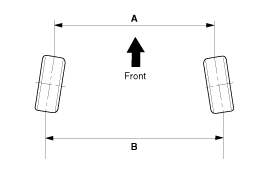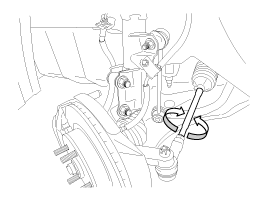 Kia Rio: Front Wheel Alignment
Kia Rio: Front Wheel Alignment
When using a commercially available computerized wheel alignment
equipment to inspect the front wheel alignment, always position the
vehicle on a level surface with the front wheels facing straight ahead.
Prior to inspection, make sure that the front suspension and steering
system are in normal operating condition and that the tires are inflated
to the specified pressure.
Toe

B - A > 0: Toe in (+)
B - A < 0: Toe out (-)
|
Toe Adjustment
|
1. |
Loosen the tie rod end lock nut.
|
|
2. |
Remove the bellows clip to prevent the bellows from being twisted.
|
|
3. |
Adjust the toe by screwing or unscrewing the tie rod. Toe adjustment
should be made by turning the right and left tie rods by the same amount.
Toe:
Total : 0°±0.2°
Individual : 0°±0.1°
|

|
|
4. |
When completing the toe adjustment, install the bellows clip and
tighten the tie rod end lock nut to specified torque.
Tightening torque :
23.5 ~ 33.3N.m (2.4 ~ 3.4kgf.m, 17.4 ~ 24.6lb-ft)
|
|
|
5. |
Compensate the steering angle sensor after adjusting the wheel
alignment.
(Refer to Steering System - "Steering Column-Shaft")
|
Camber and Caster
Camber and Caster are pre-set at the factory, so they do not need to be
adjusted. If the camber and caster are not within the standard value, replace
or repair the damaged parts and then inspect again.
Camber angle : -0.5° ±
0.5°
|
Caster angle : 4.1° ± 0.5°
|
When using a commercially available computerized wheel alignment
equipment to inspect the rear wheel alignment, always p ...
See also:
Oil Pump Unit (OPU) Connector
Opu Connector Terminal Function
EGGG114-A
EGGG114-B
Pin No.
Description
Pin No.
Description
1
Motor power(W)
...
Engine Oil: Inspection
1.
Check the engine oil quality.
Check the oil deterioration, entry of water, discoloring of thinning.
If the quality is visibly poor, replace the oil.
...
Fluid Components Location
1. Injection hole(eyebolt)
2. Oil level plug
3. Oil drain plug
...
 Kia Rio: Front Wheel Alignment
Kia Rio: Front Wheel Alignment


 Tires/Wheels
Tires/Wheels Rear Wheel Alignment
Rear Wheel Alignment